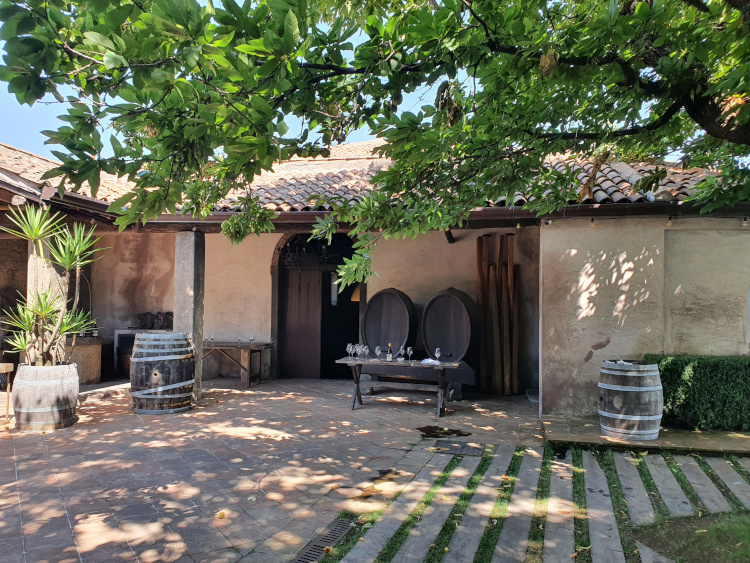What’s better than a good glass of Etna wine after a nice trekking?
Each wine region offers its own unique places and special grape varieties. In Sicily, Etna with its 1000 faces invites you to hike, either high up on the summit craters in steep areas or through the gentle forests of Etna’s pine, beech, chestnut or birch trees. On Etna, you can reward yourself with a tasting of the special wines grown on this mineral-rich volcanic rock.
The DOC (Denominazione di origine controllata, controlled designation of origin) “Etna”, is reserved for wines that meet the requirements set out in the production specification. The following wines are differentiated:
- Etna Bianco / Etna Bianco Superiore (white wines)
- Etna Rosso / Etna Rosso Riserva (red wines)
- Etna Rosato (rosé wines)
- Etna Spumante (Sparkling wine)
The white Etna DOC wine must be obtained from grapes grown in the vineyards of the Etna area. It must be made from at least 60% Carricante (an ancient grape variety), a maximum of 40% Catarratto and a maximum of 15% other white non-aromatic grapes from Sicily, such as Trebbiano or Minnella bianca.
The production of Superiore white wine is reserved for wines made from grapes produced in the area of the municipality of Milo. The wine must consist of at least 80% Carricante.
The red DOC wines “Etna” and “Etna” Reserve and the rosé wine “Etna” must contain: at least 80% Nerello Mascalese and 0 to 20% Nerello Mantellato (Nerello Cappuccio); in addition, up to 10% of other non-aromatic white grapes from Sicily may be used.
And finally for the DOC sparkling wine “Etna” (rosé or white wine): at least 60% Nerello Mascalese and a maximum of 40% other Sicilian grape varieties.
The Etna wine soils and the grape harvest
The soils on which the vines grow on Etna are of volcanic origin and are formed by the decay of lava masses, ash and lapilli.
They are generally blackish in colour and very fertile. The combination of soil, climate and the knowledge of the winemakers has made the Etna area an ideal place for producing unique wines of the highest quality.
The grapes are harvested by hand in late summer and early autumn. The harvest has always been a big celebration attended by relatives, friends and acquaintances.
The grapes are then selected and treated to better enhance the characteristics of each vineyard. Then they are made into wine in large cellars. Maturation takes place mainly in oak barrels, which are usually located in underground cellars.
On our Etna & Wine Tour we visit one of the many wine cellars scattered throughout the Etna area and enjoy appetizers and typical dishes of the region, accompanied by suitable wines to enhance the taste of the food.

Italian and European wines
Italy not only offers you the DOC wines of Etna, the wines of Veneto are also known worldwide, for example: Amarone della Valpolicella, Prosecco Conegliano Valdobbiabene, Romagna wines such as Lambrusco or Tuscan wines such as Chianti and Brunello di Montalcino, etc.
Every country and region of our Europe has its own and unique wines.
North of Italy we have interesting areas for the cultivation and production of wines.
In Austria, for example, Grüner Veltliner and Riesling thrive in one of Austria’s most beautiful wine regions, the Wachau.
The Wachau stretches along the Danube between Melk and Krems and is now part of the UNESCO World Heritage. The area can be hiked in 14 stages north and south of the Danube. On the paths that lead up and down the hills, you will cross the sunny vineyards and the shady forests. They lead you to bizarre rock formations and fantastic cliffs from which you can enjoy a breathtaking view that offers a magnificent view of the mighty Danube. And after the excursion you can fortify yourself in a Heurigen, a restaurant where the winegrowers also offer numerous culinary delicacies in addition to their wines.
In Germany, Riesling, Silvaner, Müller Thurgau, Kerner, Gewürztraminer and Pinot Blanc are produced.
In Slovenia you can explore three wine regions: Primorska (coastal region), Podravska (Drava region) and Posavska (lower Sava region). Each of these regions has a variety of wines with different characteristics. This is due to differences in soil minerals, differences in climate, and differences in ripening.
